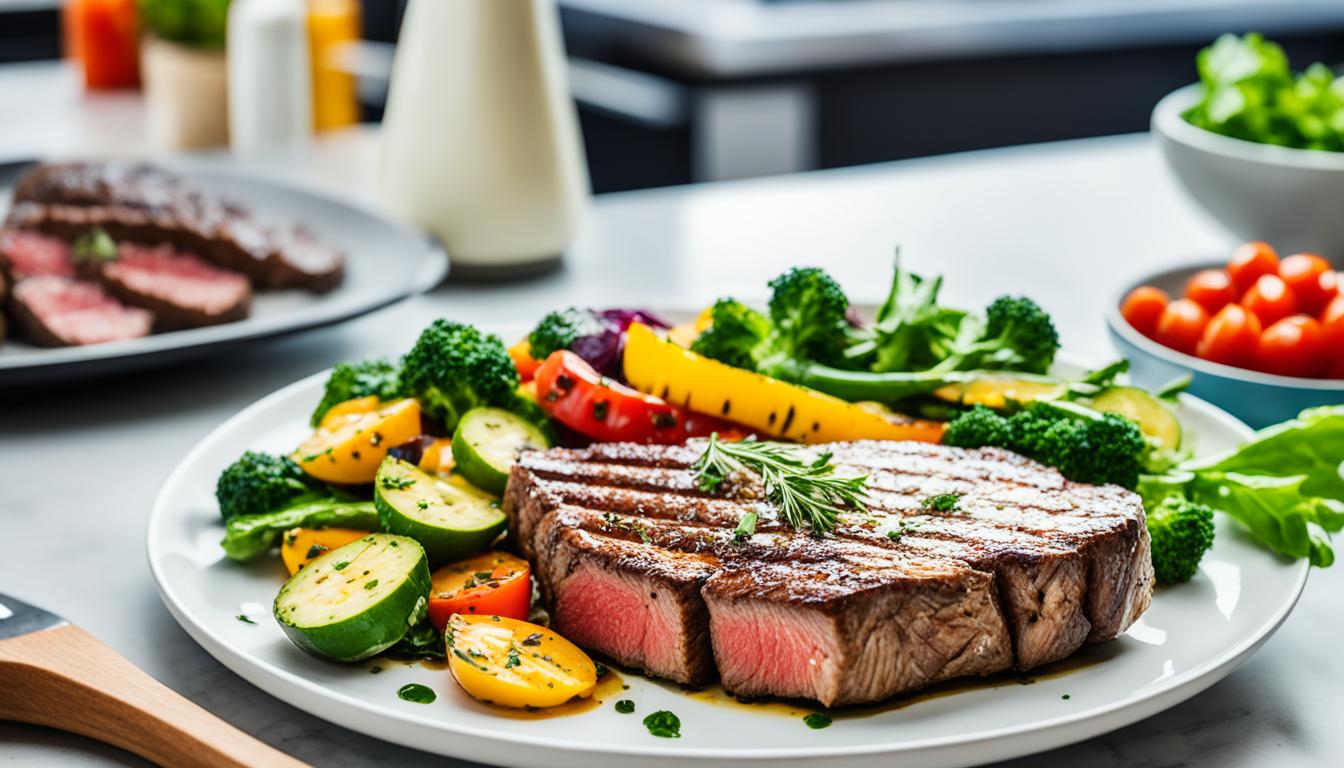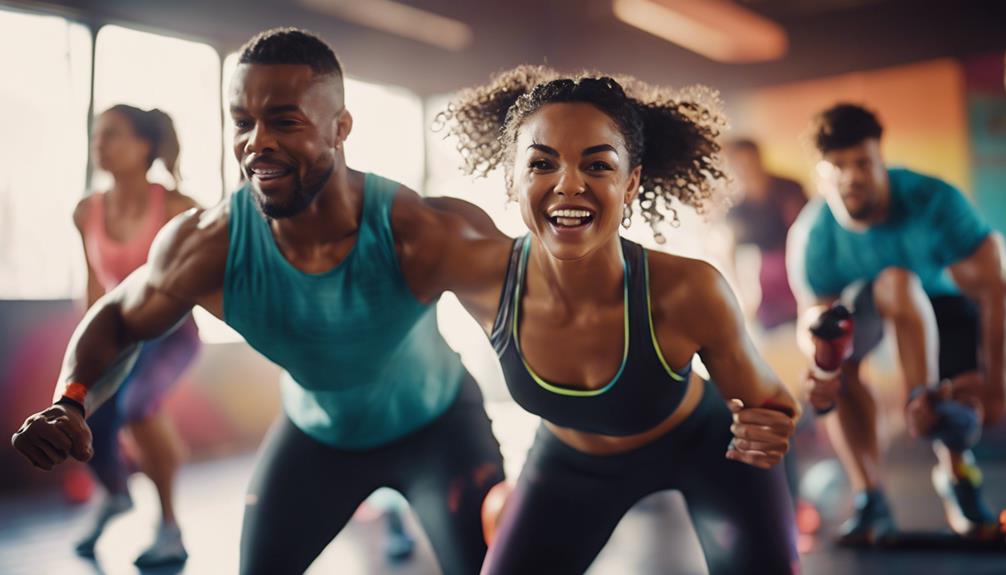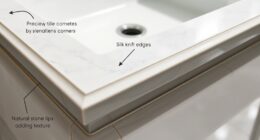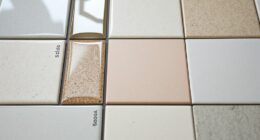Have you ever experienced that incredible feeling of euphoria after exercising? It’s like your body and mind are in perfect harmony. However, the busyness of life can sometimes make it challenging to maintain this feeling. You might question if it’s possible to prioritize fitness in a packed schedule. But here’s some good news: you don’t need to spend hours at the gym to see results. Studies have proven that just 30 minutes a day, five days a week, can make a significant difference in your life. These workouts can be tailored to your preferences, making exercise enjoyable and stimulating. Embarking on your fitness journey involves redefining what it means to be healthy and appreciating the routines that promote well-being.
A well-planned workout schedule can lead to amazing health benefits. It can include short but effective sessions. Whether you’re into lifting weights or doing high-intensity interval training (HIIT), achieving your goals is possible. It’s time to commit to taking care of yourself. Let’s start this journey to becoming healthier and happier, together.
Key Takeaways
- 30 minutes of structured exercise five times a week can yield significant health benefits.
- HIIT workouts promote energy expenditure and can lead to extended post-exercise calorie burn.
- Balancing cardio, strength training, and HIIT in your fitness routines enhances results.
- Low-impact workouts, such as Pilates, provide safe options for strength building and calorie burning.
- Starting with light weights and focusing on proper form is essential to prevent injury.
Understanding the Importance of Regular Exercise
Regular exercise is key to a healthy life. It helps you manage your weight and offers many benefits for your body and mind. Regular workouts improve your overall health.
Benefits of Getting Fit
Being active has lots of perks for your body and mind. Here are some of the main benefits:
- Improved Cardiovascular Health: Exercise makes your heart strong and improves blood flow. This lowers your chance of heart disease.
- Mood Enhancement: Working out releases endorphins, making you feel happier and more positive.
- Better Sleep Quality: A regular workout routine can help you sleep better. You’ll wake up feeling refreshed and energetic.
- Weight Control: Exercise burns calories which helps with weight control and reduces obesity risk.
- Increased Energy Levels: Staying active boosts your stamina and fights off tiredness during your day.
How Regular Exercise Affects Mental Health
There’s a strong link between exercise and mental health. Regular physical activity greatly benefits your mental wellness. Here’s how:
- Reduced Depression and Anxiety: Less active people are more prone to depression. Just 90 minutes of exercise a week can have the same positive effect as antidepressants for mild to moderate depression.
- Enhanced Cognitive Function: Exercise boosts brain health, improving focus, clear thinking, and cognitive skills.
- Stress Management: Working out is a great way to deal with stress. It helps release tension and promotes relaxation.
- Social Engagement: Group exercises or classes can help you make friends and reduce feelings of loneliness.
Knowing the benefits of exercise can inspire you to work out regularly. The U.S. Department of Health recommends 150 minutes of moderate aerobic activity or 75 minutes of vigorous activity per week. It’s essential to have a regular exercise plan.
| Type of Exercise | Recommended Duration | Benefits |
|---|---|---|
| Aerobic Activity | 150 minutes moderate or 75 minutes vigorous per week | Improves cardiovascular health, aids in weight management |
| Strength Training | 2-3 times per week | Builds muscle mass, improves bone strength |
| Balance Exercises | At least 3 times per week | Enhances stability, prevents falls |
| Stretching | Daily | Maintains flexibility, reduces injury risk |
Setting Realistic Fitness Goals
Creating realistic fitness goals is essential for long-term health. Using the SMART criteria helps organize your plan for success. It stands for Specific, Measurable, Achievable, Relevant, and Time-bound. This method gives clear steps for your workout journey.
Defining SMART Goals
Make your fitness goals work by following the SMART approach:
- Specific: Clearly state your goal. Like planning to do a 30-minute bodyweight workout three times a week.
- Measurable: Track your progress. You could measure improvements in a plank test or squats completed in a minute.
- Achievable: Choose realistic goals. Slowly build up to a 5K run over three months as a beginner’s goal.
- Relevant: Make sure your goals fit your overall fitness aims. If you want to build muscle, focus on workouts that support muscle growth.
- Time-bound: Set a deadline. Aim to stretch or do yoga twice weekly to boost flexibility by a specific date.
Tracking Your Progress
Keeping tabs on your progress is key to staying driven. Regular check-ins allow tweaks to your plan based on your progress. Use various methods, like fitness apps or journals, to track vital stats including heart rate.
- Imagining your goals can boost your performance, exercise regularity, and confidence.
- Setting smaller, step-by-step goals helps keep your motivation high.
- It’s crucial to pay attention to your body’s signals during exercise to avoid injury.
View your fitness goals as changes to your lifestyle, not just short-term fixes. Being able to adjust your goals with ongoing feedback is important. Lastly, consult a personal trainer for advice on adjustments to enhance your success safely.
Types of Gym-Workouts to Consider
An effective workout plan includes different exercises. Each type offers unique benefits for your fitness. Choosing the right workouts will help you reach your goals.
Cardiovascular Workouts
Cardio exercises raise your heart rate and make your heart stronger. You can do things like run, cycle, swim, or walk fast. Besides helping with endurance, they help control your weight. Doing cardio often can also lower your chance of getting sick and improve your mood.
Strength Training Programs
Strength training is key for a good workout routine. It’s recommended to do these exercises at least two times a week. They help you build muscle and strengthen your bones. You can work on different body parts like your chest with bench presses.
- Bench press for chest
- One-arm dumbbell row for back
- Biceps curls for arms
- Plank for abdominals
- Squats for legs
- Seated shoulder press for shoulders
It’s great to do strength training three times a week. Remember to rest for two days between sessions for the best muscle growth.
High-Intensity Interval Training (HIIT)
HIIT is a workout style that is very efficient. It mixes short, strong exercises with breaks. HIIT not only improves your heart health but also burns more calories afterward. Adding HIIT to your workouts can help you get fit faster.

| Workout Type | Benefits | Frequency Recommendations |
|---|---|---|
| Cardiovascular Workouts | Improves heart health, burns calories, enhances endurance | At least 150 minutes of moderate cardio each week |
| Strength Training Programs | Increases muscle mass, enhances bone density | 2-3 times per week with rest days between |
| HIIT | Boosts metabolism, time-efficient, improves endurance | 1-3 times per week, based on intensity |
Creating an Efficient Workout Schedule
Crafting an effective workout schedule is key on your fitness path. It ensures you push yourself and rest well. Balance between activity and recovery boosts your performance and cuts injury risks. With variety in your routine and smart rest, reaching your fitness dreams becomes easier.
How to Balance Workouts and Recovery
It’s important to plan your routine with your energy in mind. Aim to exercise 2 to 4 times each week, 30 to 45 minutes at a time. This keeps you moving forward without getting burnt out. Here are some tips to keep your workouts in check:
- Include easy days of walking or light yoga for rest.
- Mix up your routine with strength, cardio, and HIIT for excitement and balance.
- Always listen to your body. If tired, rest and let your muscles heal.
Sample Weekly Workout Plan
Having a weekly plan makes sticking to your routine simpler. Here’s a sample plan that mixes workout types and includes rest:
| Day | Workout Type | Duration |
|---|---|---|
| Monday | Cardio (running or cycling) | 30-45 minutes |
| Tuesday | Strength Training (full-body) | 30-45 minutes |
| Wednesday | Active Recovery (walking/yoga) | 30 minutes |
| Thursday | HIIT Workout | 30 minutes |
| Friday | Strength Training (upper/body) | 30-45 minutes |
| Saturday | Cardio (swimming or aerobics) | 30-45 minutes |
| Sunday | Rest Day | – |
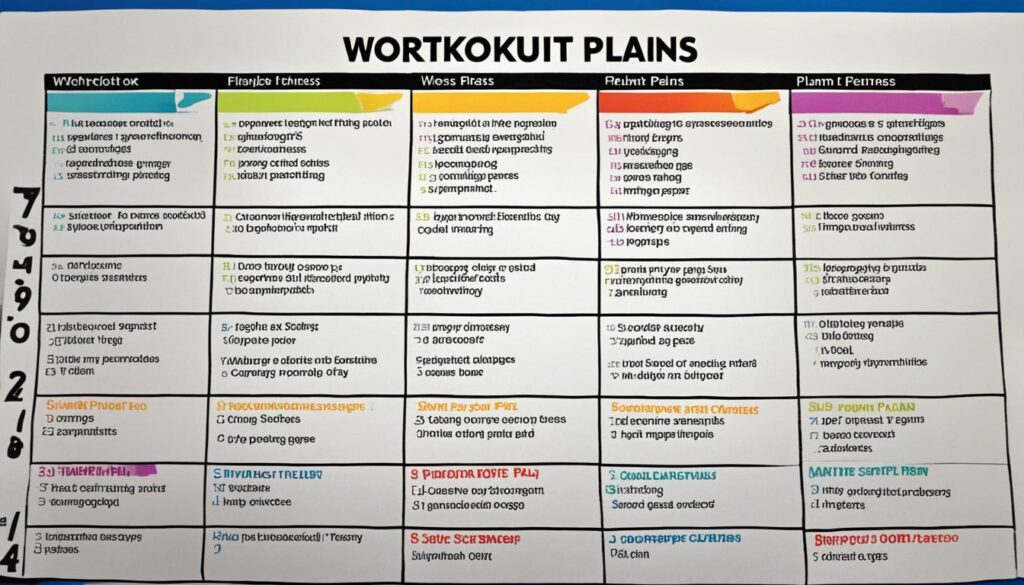
This plan is just a start. Feel free to tweak it based on your needs and goals. Recovery days are key to better performance and staying motivated. Embrace your health journey with a mix of exercise and rest.
The Role of Full-Body Exercises
Full-body workouts make your workout routine more effective. They work many muscle groups at once, boosting health and fitness. Full-body routines give you a great workout without needing lots of time.
Benefits of Engaging Multiple Muscle Groups
These workouts have many benefits. They burn calories and build strength by working many muscles together. This is great for people with tight schedules. You only need two to three workouts a week, leaving time for rest and life’s demands.
- Increased calorie expenditure
- Improved functional fitness
- Enhanced recovery through reduced CNS stress
- Lower risk of workout monotony
- Simpler scheduling that boosts consistency
Examples of Full-Body Exercises
A balanced full-body workout mixes strength exercises and cardio. Here’s a circuit to do three times a week for a month:
| Exercise | Reps | Rest (seconds) |
|---|---|---|
| Dumbbell Romanian Deadlift | 10-12 | 60 |
| Alternating Dumbbell Row | 10-12 | 60 |
| Side-Plank Press | 8-10 (each side) | 60 |
| Glute Bridge Floor Press | 10-12 | 60 |
| Bulgarian Split Squat | 8-10 (each leg) | 60 |
| Hollow Body Hold | 30 seconds | No rest |
To improve, try slightly more weight each week. Reduce reps by one for each exercise, except the Hollow Body Hold. This keeps your workouts hard and rewarding.

Understanding the Basics of Strength Training
Strength training is key to a great fitness plan. It focuses on building muscle strength, endurance, and better metabolism. Compound lifts, like squats and deadlifts, work many muscles at once. To get the best results and avoid injuries, it’s important to do exercises the right way.
Importance of Compound Lifts
Compound lifts involve multiple joints and muscle groups. For example, think of squats, deadlifts, and bench presses. These exercises are great because:
- Efficiency: They work many muscles, making workouts faster.
- Functional Strength: They help with everyday activities.
- Metabolic Boost: They raise your heart rate, giving cardio benefits too.
To get a complete workout, add compound lifts to your routine at least twice a week. This follows the U.S. Department of Health’s advice. Doing so works out all the major muscle groups well.
Effective Form for Strength Training Exercises
Doing exercises correctly is crucial. The wrong form can cause injuries and less effective workouts. Here are some guidelines to follow:
- Warm-Up: Start with 5 to 10 minutes of light aerobic activity.
- Controlled Movements: Aim for smooth reps, usually 12 to 15 times.
- Rest Periods: Take about a minute break between exercises to rest properly.
- Progressive Overload: As you get stronger, slowly increase your weights but keep your form right.

For best results, spend 30 to 60 minutes on this, twice per week. Focusing on how you perform each exercise is key. For beginners, doing just one set until muscle fatigue is often enough. Always check with a doctor before starting, especially if you have health issues. Strength training not only builds muscle and flexibility. It also improves your overall physical and mental health.
| Key Components | Recommendations |
|---|---|
| Warm-Up | 5 to 10 minutes of brisk walking or aerobic activity |
| Exercise Frequency | At least twice a week |
| Rest Between Sets | About one minute |
| Repetitions | 12 to 15 for strength training |
| Exertion Level | Starting 3-4, progressing to 8/10 |
Incorporating Cardio in Your Routine
Adding cardio to your fitness plan is key for a healthy heart and weight management. It’s important to know the difference between moderate and vigorous workouts to plan well. Each type of workout has unique benefits for your fitness levels and objectives.
Moderate vs. Vigorous Intensity Workouts
Moderate workouts, like fast walking or easy biking, let you talk but make you a bit breathless. The American College of Sports Medicine suggests at least 150 minutes of it each week. On the other hand, vigorous exercises, such as running or intense aerobics, push your heart rate up and make talking hard. You should do 75 minutes of such activities weekly to see benefits.
Choosing the Right Cardiovascular Exercises for You
Choosing the right cardio depends on what you enjoy and your daily life. Exercise bikes, like the Schwinn IC4, are good for building leg strength without hard impacts. Blending cardio with strength exercises is smart; HIIT boosts calorie burning and muscle building. You can switch up your routine with activities like:
- Walking or jogging
- Cycling
- Burpees
- Kettlebell swings
- Jumping jacks

Mixing different intensities in your cardio improves fitness. Tracking your heart rate helps ensure you’re working out at the right level.
Optimizing Your Gym-Workouts for Efficiency
Make your gym workouts better to get fit faster. The EPOC effect helps a lot. It stands for excess post-exercise oxygen consumption. This effect boosts how many calories you burn after exercising. High-intensity exercises can make this effect even stronger.
Understanding the EPOC Effect
Your body needs more oxygen to recover after working out hard. This leads to a higher metabolic rate. So, you keep burning calories even after leaving the gym. Doing short, high-intensity interval training (HIIT) can start this process. This means you get better results in less time.
Strategies for Short, Effective Workouts
To get the most out of short workouts, use these techniques:
- Supersetting: Pair exercises together to cut down on rest time and up the intensity.
- Circuit Training: Quickly switch between different exercises with minimal rest.
- Interval Training: Mix high-intensity effort with rest periods to burn more calories.
Plan your workouts well. Include a warm-up and list what you need for the gym. Regularly check your goals to stay focused. You might also want to talk to a fitness expert for personalized advice based on your fitness level.

| Technique | Benefits |
|---|---|
| Supersetting | Reduces rest time, boosts workout intensity. |
| Circuit Training | Engages multiple muscle groups efficiently. |
| Interval Training | Increases cardio fitness, maximizes calorie burn. |
Using these tips means short workouts can give you the fitness results you want.
The Power of Low-Impact Workouts
Today, many people love low-impact workouts for building strength and fitness without harming their joints. Whether you’re healing from injury or mixing in with hard workouts, options like Pilates and barre can really help your body. They aim for better movement, stability, and core strength. Plus, they lower injury risks, great for those with limits.
Benefits of Pilates and Barre Classes
Pilates and barre classes bring lots of perks, like stronger muscles, good posture, and more flexibility. These workouts test your strength while also improving balance. They’re perfect for a total fitness plan. Their big plus is how they fit all fitness levels, letting you adjust how hard you work.
Incorporating Rest Days and Active Recovery
It’s crucial to add rest days and active recovery to your workout plan. This keeps up your motivation and lowers injury chances. Your body needs time to heal. You can do light activities like walking or swimming or use foam rollers on rest days. Rest and recovery help you perform better later and keep you on track to achieve your fitness dreams safely.


